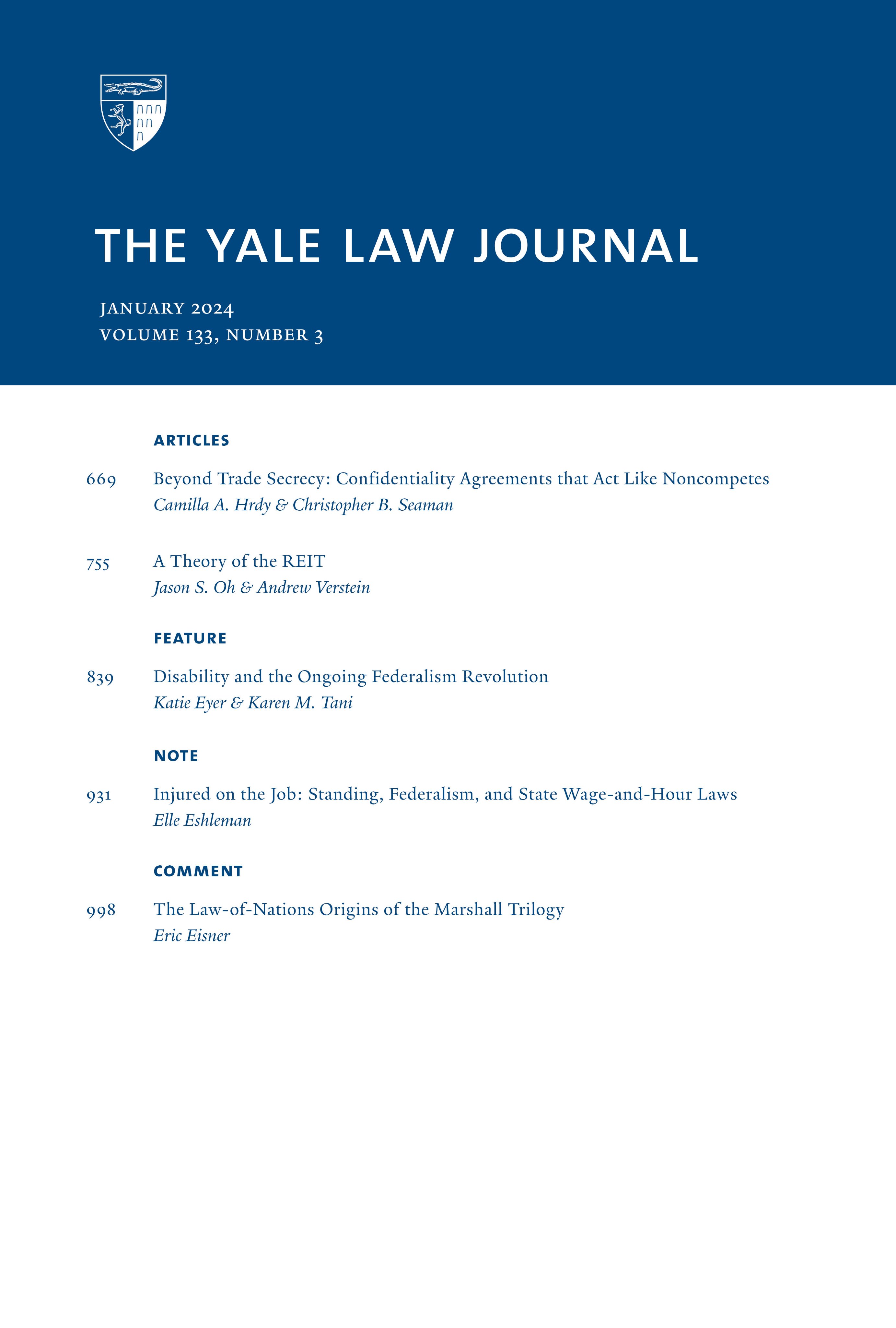行政与“民主”:从杰克逊到林肯的行政法,1829-1861
IF 5.2
1区 社会学
Q1 LAW
引用次数: 9
摘要
杰克逊时代的美国在技术上、经济上、地理上、社会上和政治上都是一个快速转型的国家。区域划分的加剧、城市化和移民的指数级增长、工厂生产的增加以及经济繁荣与萧条的反复循环,都助长了人们对政治改革的急切渴望。对于杰克逊式的民主党人来说,对这种普遍渴望的答案是重建美国民主——包括扩大选民范围,公职向所有人开放,消除垄断和其他特权。国家一级的政府将保持小规模,并归还给人民。但是,正如经常发生的那样,民主的制度化要求相应增加政府的能力。摧毁“怪物银行”的权力,赋予财政部管理货币政策和财政转移的新权力和能力。通过新的轮流任职制度向所有人开放的职务产生了官僚控制制度的需要,以取代基于地位的限制和个人忠诚。科技发展的副作用,特别是伴随着蒸汽船旅行的快速扩张而带来的人类大屠杀,促使了一个公认的现代健康和安全监管体系的建立。杰克逊学派所建立的民主制度既促进了美国行政国家的建设,又巩固了19世纪美国行政法的新兴模式。在这种模式中,行政责任主要是(1)政治监督和指导以及(2)内部等级控制的问题。对行政的司法控制具有一种狭隘的审查观点,即发现行政裁量权,因此在负责官员认为几乎需要的任何地方都是不可审查的。然而,作为个人,只要陪审团根据一些标准的普通法侵权行为或财产诉讼认定官员的行为未经授权,官员就必须对损害赔偿承担个人责任。尽管在21世纪的法律想象中,以这种方式构建的行政法似乎很奇怪,甚至几乎看不见,但它与杰克逊的民主意识形态非常吻合。民主党并不认为司法机构有权利保护犯错的官员免于对其同胞承担赔偿责任,或者干涉由民选总统领导的行政部门的自由裁量权。政府内部的等级控制有官僚主义的味道,但当被视为加强民选总统执行人民意愿的权力时,就不会有官僚主义的味道了。官僚主义被理解为对行政部门官员的等级控制,而民主被理解为总统主义,它们是互补的,而不是竞争的。当时和现在一样,总统和国会之间争夺行政控制权的竞争几乎完全是通过制度上的争论来调解的,而不是通过司法裁决。但对杰克逊主义者来说,而不是对我们来说,这种普遍的党派斗争是他们所塑造的新民主主义的本质,而不是对某些无党派的民主审议理想的玷污。本文章由计算机程序翻译,如有差异,请以英文原文为准。
Administration and 'The Democracy': Administrative Law from Jackson to Lincoln, 1829-1861
Jacksonian America was a country in rapid transition, technologically, economically, geographically, sociologically and politically. Intensified sectional divisions, exponential increases in urbanization and immigration, the rise of factory production, and repeated cycles of economic boom and bust helped to fuel an anxious desire for political reform. For Jacksonian Democrats the answer to this popular yearning was the reconstruction of American democracy - including a broadened electorate, offices open to all and the elimination of monopoly and other special privileges. Government at the national level was to be kept small and returned to the people. But as is often the case, the institutionalization of democracy demands a corresponding increase in governmental capacities. Destroying the power of the Monster Bank gave new powers and capacities to the Treasury for the management of monetary policy and fiscal transfers. Offices open to all through the new system of rotation in office created the need for bureaucratic systems of control that replaced status-based restraints and personal loyalties. And the side-effects of technological development, in particular the human carnage that accompanied the rapid expansion of steamboat travel, prompted the creation of a recognizably modern system of health and safety regulation. The Democracy established by the Jacksonians both furthered the building of an American administrative state and solidified an emerging, 19th Century, model of American administration law. In that model administrative accountability was preeminently a matter of (1) political oversight and direction and (2) internal hierarchical control. Judicial control of administration featured a cramped vision of mandamus review that found administrative discretion, and therefore non-reviewability, almost anywhere thought by the responsible official was required. Yet, as individuals, officials remained personally responsible for damages whenever a jury determined that their actions were unauthorized pursuant to some standard common law tort or property action. Although administrative law structured in this fashion seems peculiar, indeed almost invisible, to the 21st Century legal imagination, it fit comfortably within Jacksonian democratic ideology. The Democracy did not envision the judiciary as having a mandate to protect errant officials from responsibility to their fellow citizens for compensation, or to interfere with the discretionary authority of an executive branch headed by a popularly-elected President. Internal hierarchical control of administration smacks of bureaucracy, but not when viewed as reinforcing the elected President's power to carry out the people's will. Bureaucracy, understood as hierarchical control of executive branches officials, and democracy, understood in presidentialist terms, were complements, not competitors. Then, as now, competition between the President and Congress for control of administration was mediated almost exclusively by institutional contestation, not by judicial adjudication. But for Jacksonian's, more than for us, this generally partisan struggle was the essence of the new democracy that they had fashioned, not a blemish on some non-partisan ideal of democratic deliberation.
求助全文
通过发布文献求助,成功后即可免费获取论文全文。
去求助
来源期刊

Yale Law Journal
LAW-
CiteScore
4.50
自引率
6.20%
发文量
0
期刊介绍:
The Yale Law Journal Online is the online companion to The Yale Law Journal. It replaces The Pocket Part, which was the first such companion to be published by a leading law review. YLJ Online will continue The Pocket Part"s mission of augmenting the scholarship printed in The Yale Law Journal by providing original Essays, legal commentaries, responses to articles printed in the Journal, podcast and iTunes University recordings of various pieces, and other works by both established and emerging academics and practitioners.
 求助内容:
求助内容: 应助结果提醒方式:
应助结果提醒方式:


